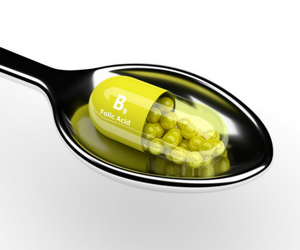

5 important vitamins for a healthy pregnancy from @deliciousliving #prenatalvitamins #healthypregnancy
We all want to eat well. But once you have a bun in the oven—and thus are responsible for feeding not just yourself but baby, too—then it’s even more important to be sure you get the proper nutrition you both need. In addition to eating a range of nutrient-dense foods that provide protein, calcium, folate and iron, you’ll also want to take a prenatal vitamin—ideally before you start trying to conceive and throughout breast-feeding—to ensure you and baby are getting the important stuff.
Here are five vital prenatal nutrients. 
Folic acid

The most well-established tenet of prenatal nutrition is the need for the B vitamin folate or, more commonly, its synthetic form, folic acid, which prevents the lifelong neural tube defect known as spina bifida. This knowledge led the federal government in 1998 to mandate food fortification with folic acid. In 2015, researchers concluded that the mandatory fortification of 400 mcg folic acid into wheat and corn flour prevented more than 35,000 cases of neural tube defects.
Iron
 Iron is the Uber of minerals—it transports oxygen from the lungs to tissues and shuttles back carbon dioxide from tissues to lungs. You need it more than ever during female growth stages, such as with pregnancy and lactation. This is indicated when you look at the Daily Value of iron, which is 8 mg/day for adult men and 18 mg/day for girls from adolescence onward, but jumps to 27 mg/day for pregnant women.
Iron is the Uber of minerals—it transports oxygen from the lungs to tissues and shuttles back carbon dioxide from tissues to lungs. You need it more than ever during female growth stages, such as with pregnancy and lactation. This is indicated when you look at the Daily Value of iron, which is 8 mg/day for adult men and 18 mg/day for girls from adolescence onward, but jumps to 27 mg/day for pregnant women.
The good news is the iron requirement of 27 mg is the amount found in most prenatal multivitamins.
DHA
 This omega-3 fatty acid is known for its positive influence on brain development, not least because DHA is a major structural component of the brain, comprising about 15 percent of the cerebral cortex. In addition, studies have found that 600 mg/day of DHA for the last half of pregnancy results in longer gestation time, as well as greater birth weight, length and head circumference. It also results in fewer premature births and shorter hospital stays for preemies.
This omega-3 fatty acid is known for its positive influence on brain development, not least because DHA is a major structural component of the brain, comprising about 15 percent of the cerebral cortex. In addition, studies have found that 600 mg/day of DHA for the last half of pregnancy results in longer gestation time, as well as greater birth weight, length and head circumference. It also results in fewer premature births and shorter hospital stays for preemies.
In your zeal to consume lots of DHA when pregnant, be aware that fish oil makes blood platelets less sticky, which is why it’s good for cardiovascular health. But upon childbirth, it could lead to excessive bleeding, particularly with the omega-3 EPA. To prevent that, the Mayo Clinic advises you take no more than 3 grams per day.
Probiotics
 Friendly bacteria, as you know, are good for digestive health and immune function—and they can benefit pregnancy, too. But be aware: Probiotic strains matter. Although probiotics help prevent infant eczema, constipation, diarrhea and sick days during pregnancy, not just any run-of-the-mill acidophilus will do. Research shows the probiotic strains of Lactobacillus rhamnosus HN001 and Bifidobacterium lactis HN019 are the ones for you here.
Friendly bacteria, as you know, are good for digestive health and immune function—and they can benefit pregnancy, too. But be aware: Probiotic strains matter. Although probiotics help prevent infant eczema, constipation, diarrhea and sick days during pregnancy, not just any run-of-the-mill acidophilus will do. Research shows the probiotic strains of Lactobacillus rhamnosus HN001 and Bifidobacterium lactis HN019 are the ones for you here.
A study using different probiotic strains—L. rhamnosus GG with B. animalis Bb-12 and L. acidophilus La-5—found no effect on eczema.
The upshot of the probiotic story is: Shop wisely!
Vitamin D
 What isn’t the sunshine vitamin good for? A recent study compared pregnant women taking 2,000 IU/day or 4,000 IU/day of vitamin D3, and found the higher level led to fewer incidences of preeclampsia (high blood pressure), gestational diabetes, bacterial vaginosis and infection. Another group of researchers looked at 13 studies and found that women with blood levels of vitamin D higher than 20 ng/dL had higher birth-weight and birth-length babies. The study reported no effects on gestational diabetes or preeclampsia, but then again, the cutoff was only 20 ng/dL, and as any good naturopathic physician will tell you, you’d like a number that is double that.
What isn’t the sunshine vitamin good for? A recent study compared pregnant women taking 2,000 IU/day or 4,000 IU/day of vitamin D3, and found the higher level led to fewer incidences of preeclampsia (high blood pressure), gestational diabetes, bacterial vaginosis and infection. Another group of researchers looked at 13 studies and found that women with blood levels of vitamin D higher than 20 ng/dL had higher birth-weight and birth-length babies. The study reported no effects on gestational diabetes or preeclampsia, but then again, the cutoff was only 20 ng/dL, and as any good naturopathic physician will tell you, you’d like a number that is double that.